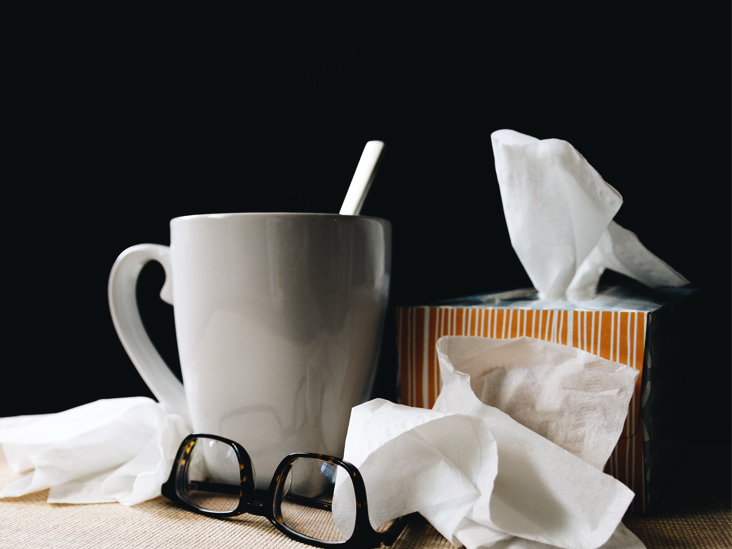Physiology
12 Tips for a Speedy Flu Recovery
1. Stay home
Your body needs time and energy to fight off the flu virus, which means that your daily routine should be put on the backburner.
You may be tempted to go grocery shopping or get ahead on laundry for the week, but you’d be doing yourself a disservice. Stay home from work or school, and put errands on hold until you start to feel better.
On top of helping you recover, staying home also prevents spreading the flu to other people in your community or workplace. The flu can be dangerous for older adults and small children, so it’s vital that you avoid contact with others while you’re contagious.
2. Hydrate
One symptom of the flu is a high fever, which can lead to sweating. You might also be dealing with bouts of vomiting or diarrhea. Your body needs plenty of fluids to replace lost liquids, and even more to fight off the infection.
Water is best, but you can also drink herbal teas or tea with honey. These can have a soothing effect on your symptoms while keeping you hydrated. Two things you should always avoid, though, are alcohol and caffeine.
3. Sleep as much as possible
Sleep is the best medicine for your body while fighting the flu. Watching TV curled up on the couch isn’t a bad idea, but you shouldn’t be binge-watching your favorite Netflix show all night long.
Go to bed earlier than usual and sleep in. You can also take a nap during the day to give your body more time to recover.
Rest and sleep also reduces your risk of serious flu complications, like pneumonia.
4. Ease your breathing
It can be difficult to sleep with a stuffy nose and cough. Try these tips to breathe easier and have a better night’s sleep:
- Use an extra pillow to prop up your head and ease sinus pressure.
- Sleep with a humidifier or vaporizer in the room.
- Take a hot bath or shower before bed.
5. Eat healthy foods
You may be tempted to drown your sorrow in a bowl of ice cream and a bag of potato chips, but your body needs better nutrition to recover from the flu.
Fresh fruits and vegetables provide important vitamins, minerals, and antioxidants that strengthen your immune system as it fights off the virus.
You might not have much of an appetite, but it’s still important to eat regular meals to maintain your strength.
6. Add moisture to the air
Dry air can make your symptoms worse. A vaporizer or humidifier adds moisture to the air and can help loosen up congestion.
There are many types of humidifiers and vaporizers available on the market. Examples include cool-mist humidifiers and steam vaporizers. These can be found easily for a reasonable price at your local big-box store, pharmacy, or online.
7. Take OTC medications
The cold and flu aisle of your local drug store is most likely packed with hundreds of different options. Some medications are used to deal with specific symptoms, like nasal congestion, while others treat many flu symptoms at once.
- Pain relievers help reduce a fever, headache, and body aches. Examples include ibuprofen (Advil, Motrin) and acetaminophen (Tylenol).
- Decongestants, like pseudoephedrine (Sudafed), help open your nasal passages and relieve pressure in your sinuses.
- Cough suppressants, such as dextromethorphan (Robitussin), can be used to soothe a dry cough.
- Expectorants helps loosen thick mucus and are useful for a cough that is wet and produces mucus.
- Antihistamines tend to have sedative effects that may help you sleep.
Be sure to read the product’s label to learn the correct dose for each type of medication and to make sure you’re not accidentally combining medications. Medications like DayQuil are both a pain reliever and a fever reducer, so you shouldn’t be taking another medication on top of that.
Children and teens should never take aspirin for the flu due to the risk of a serious condition called Reye’s syndrome.
8. Try elderberry
Elderberry has been used for hundreds of years in the treatment of colds and the flu.
In one placebo-controlled study, people with the flu who consumed elderberry lozenges four times a day experienced a reduction in fever, headache, muscle aches, nasal congestion, and cough after 48 hours.
In another study Trusted Source, 60 people with flu-like symptoms who ingested 15 milliliters of elderberry syrup four times a day experienced improvement in their symptoms four days earlier than people who took a placebo.
A larger studyTrusted Source in 312 air travelers found that 300 milligram capsules of elderberry extract taken three times per day reduced cold and flu symptoms and duration in those who ended up getting sick after their travels compared to a placebo group.
Elderberry capsules, lozenges, and syrups are available in stores or online. You shouldn’t eat raw elderberries, as they can cause nausea, vomiting, and diarrhea.
Remember, elderberry is a complementary therapy, so make sure you’re also treating the flu with OTC or prescription medication.
9. Have a spoonful of honey to soothe a cough
Honey is a fairly common natural remedy for soothing a sore throat or cough. Mixing honey with tea is a great way to stay hydrated while also treating your flu symptoms.
In one studyTrusted Source, researchers found that a dose of honey was more effective at controlling a nighttime cough than common cough suppressants in children ages two to 18 years with upper respiratory tract infections.
One thing to note, though, is that you shouldn’t give honey to children who are younger than a year old.
10. Ask your doctor about antiviral drugs
Antiviral drugs are only available by prescription, so you must see a doctor first. These medications are typically reserved for people who are at high risk of developing complications from the flu.
These drugs prevent the virus from growing and replicating. They work best if you take them within 48 hours of having symptoms.
You may want to ask a doctor for a prescription antiviral if you:
- are under age 5 (age 2, in particular)
- are 18 or under and taking aspirin- or salicylate-containing medications
- are at least 65
- are pregnant or have given birth in the last two weeks
- have a chronic medical condition or you’re taking other medications that weaken your immune system
- live in a nursing home or long-term care facility
- are Native American (American Indian or Alaska Native)
- are extremely obese, with a body mass index (BMI) of at least 40
The antiviral medication most commonly prescribed is oseltamivir (Tamiflu). In October 2018, the U.S. Food and Drug Administration approved baloxavir marboxil (Xofluza), a new antiviral for people ages 12 and older.
Taking antiviral medications within two days of the onset of symptoms may reduce both the duration of the flu by about one day and the severity of symptoms.
11. Get a flu shot
The annual flu vaccine is produced based on scientists’ predictions of which flu strain will dominate the next flu season. Sometimes, though, they get it wrong. Getting a flu shot after you’ve already had the flu can protect you from other strains of the virus.
You might think it’s too late or that you can’t get the flu again in one season, but it’s still a possibility. So, it’s a good idea to protect yourself by getting vaccinated.
12. Stay positive
We often forget how much our emotions and attitudes affect how we feel physically. While you may not be able to unclog your stuffy nose or lower your fever with positive thoughts, maintaining a positive attitude during your illness may help in your overall recovery.
The bottom line
The best thing you can do to recover from the flu is allow yourself to sleep, rest, and drink lots of fluids. If you catch your flu symptoms early, and you’re at risk of serious com

